 MyDogBreeds
MyDogBreeds German Coolie is originated from Australia but Ariege Pointer is originated from France. German Coolie may grow 7 cm / 2 inches shorter than Ariege Pointer. German Coolie may weigh 6 kg / 13 pounds lesser than Ariege Pointer. German Coolie may live 3 years more than Ariege Pointer. Both German Coolie and Ariege Pointer has almost same litter size. Both German Coolie and Ariege Pointer requires Low maintenance.
German Coolie is originated from Australia but Ariege Pointer is originated from France. German Coolie may grow 7 cm / 2 inches shorter than Ariege Pointer. German Coolie may weigh 6 kg / 13 pounds lesser than Ariege Pointer. German Coolie may live 3 years more than Ariege Pointer. Both German Coolie and Ariege Pointer has almost same litter size. Both German Coolie and Ariege Pointer requires Low maintenance.
 The German Coolie is misnamed as it is an Australian bred dog and often called the Australian Koolie or Coolie. This Australian breed is more often just called a Coolie. The breed is a typical herding breed and a working dog that needs a job all the time. They have been a favorite of Australians since the late 1800’s when local dogs were bred with British working dogs.
The German Coolie is misnamed as it is an Australian bred dog and often called the Australian Koolie or Coolie. This Australian breed is more often just called a Coolie. The breed is a typical herding breed and a working dog that needs a job all the time. They have been a favorite of Australians since the late 1800’s when local dogs were bred with British working dogs.
Although all Coolie’s are not the same. Within the breed there is a lot of variation. This is because the Coolie was bred individually for different regions in Australia. In a very different writing the Koolie Club of Australia does not define the Coolie breed on confirmation as all other purebred dogs are defined. Instead the Coolie is defined by ability to work. In light of this most Coolie breeders state that the Coolie is a breed and the variations you see among regions are types within the breed.
As a herding dog, the Coolie brought a lot of skill to the Australian farmers and sheep herders. The Coolie will round up the sheep and bring them back to their enclosure at the shepherd’s command. They are upright, silent, working dogs. Not only do they herd sheep they are important at sheering to “cut out” the sheep or assist in the close quarters of lambing.
In Queensland North and New South Wales, the Coolie is medium boned, tall and agile ready to herd cattle over a long stretch of miles. In the Snowy Mountains of New South Wales and the Hunter Valley Region, the Coolie is shorter and thicker in order to be able to get cattle that are lying low out from the gullies and dense bush. The Coolies found in Victoria are the smallest of all.
No matter where they live and work, the Coolie is bred to help the workers there, the farmers, the stockman, and the grazier. All Coolies are adaptable and very agile. They all have a strong willfulness to accomplish what they are asked to do. The ancestors of these various Coolie was the British Collie – a smooth coated, blue merle. This Collie was crossed with the Black and Tan Collie from the Scottish Highlands. It is believed that these are the same Collie breeds that came to Australia to create the Heeler.
The name may come from the German immigrants working in South Australia and unable to pronounce Collie incorrectly they called the dogs German Coolies. There is also a fraction of German breeders who believe that the German Tiger dog was brought to Australia in the 18th century and then when the Collies came they were bred together. Many Coolie breeders have records showing that the breed has been in Australia for at least 160 years. It is also believed that the Border Collie and Kelpie (Blue Heeler) were mixed into the breed at sometime as well.
No bench standard exists for the German Coolie even though there is the Koolie Club of Australia. The mission of the club is to protect, preserve and promote the breed. The Australian Sporting Register was recognizing the Coolies in 2004. They are eligible to participate in the Australian National Kennel Council sanctioned sporting trials. They participate in Queensland, New South Wales and Victoria through the individual states sporting register. Here they participate in herding, jumping, obedience, agility and tracking.
Several other recognitions as a herding breed soon followed. The Australian Shepherd Club of America, the American Herding Breed Association, were followed by recognition from others as well. They are not recognized by the American Kennel Club (AKC).
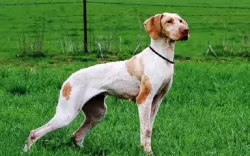 The Ariege Pointer is a French hunting dog, coming from the Ariegeois region of France.
The Ariege Pointer is a French hunting dog, coming from the Ariegeois region of France.
Known as the Ariege Pointing Dog, French Pointer or Braque de l’Ariege, these dogs came from the old French Braque dogs that were crossed with the orange and white Southern Braques.
It was in 1990 that a team of breeders decided to devote themselves to the breed’s survival. The Braque de l’Ariege was recognized by the United Kennel Club in 2006.
 With their strong ancestry among the family of collies and herders, the German Coolie shares the look of collies and shepherds. Even though they differ from region to region and there is no actual standard, they are medium sized dogs with blue or brown eyes or even one of each. The ears are folded over on top when relaxed but they are rigid and straight when he is more alert. The nose is either chocolate or red depending on the color of their coat.
With their strong ancestry among the family of collies and herders, the German Coolie shares the look of collies and shepherds. Even though they differ from region to region and there is no actual standard, they are medium sized dogs with blue or brown eyes or even one of each. The ears are folded over on top when relaxed but they are rigid and straight when he is more alert. The nose is either chocolate or red depending on the color of their coat.
They can have either a long, medium or short coat but most owners want the short coat that is smooth as well. The coat can be one color – red/chocolate or black; Bi – red/white or black/white; Tri – solid black or red with white and brown; Tri merle -merle with white and brown; Merle – red merles and blue merles. Regardless of color, the German Coolie has the look of a collie or German Shepherd.
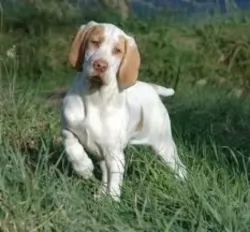 The Ariege Pointer has always been a dog kept essentially for hunting and not as a companion dog. He stands between 55 – 67cm and weighs 25 – 30kg.
The Ariege Pointer has always been a dog kept essentially for hunting and not as a companion dog. He stands between 55 – 67cm and weighs 25 – 30kg.
He is an attractive looking dog with quite a large head while the body is sleek and slender to look at. The ears are quite large and are floppy while the tail is traditionally docked to give him that distinctive look. These days the tail is often left long and hangs downwards.
The coat is short, single and rough and is white with tan or orange patches. The coat can also be speckled or ticked.
The Ariege Pointer is a hunting dog who is friendly towards strangers and therefore won’t make a particularly good watchdog.
These dog are lively, independent and good natured and they make excellent companion dogs. They are fairly docile and and get on well with children and pets in the home. Just like with any other dog, they need to be trained and socialized early.
 Yes, they can be very friendly with children is they are socialized and supervised.
Yes, they can be very friendly with children is they are socialized and supervised.
They have enough stamina to work for 14 hours a day.
They are very adaptable. They can be calm and steady when working a mother and baby lamb and then be able to forcefully move steers, bull, rams or weathers.
The breed is highly intelligent, and their learning ability is excellent because they want to please you.
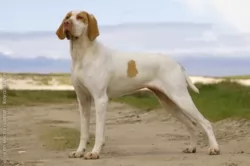 The Ariege Pointer has always been an excellent pointing- and hunting dog. When it comes to being a family pet, he puts his hunting skills aside and becomes a loyal, loving, friendly pet.
The Ariege Pointer has always been an excellent pointing- and hunting dog. When it comes to being a family pet, he puts his hunting skills aside and becomes a loyal, loving, friendly pet.
They are considered to be rare dogs, and were at one time bordering on extinction. Those who have owned one of these hunting dogs will be glad to know that they are no longer considered endangered. They’re not your friendly, social kind of dog that you find in other dog breeds, but with training and socialization he will make a fine companion and family friend.
 This is a relatively healthy breed without many genetic disorders found in purebreds due to the 160 years they have spent fairly isolated and allowing natural selection to take its course.
This is a relatively healthy breed without many genetic disorders found in purebreds due to the 160 years they have spent fairly isolated and allowing natural selection to take its course.
In Merle dogs there can be deafness and/or blindness. If you breed a solid to a merle you can eliminate that.
These are not inherited but rather acquired due to the immense amount of jumping and running.
Rare but it does occur and can be fatal if not treated
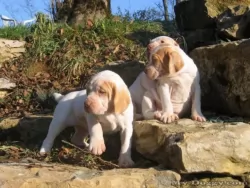 The Ariege Pointer is a working dog breed, used for hunting and retrieving prey. With good care the dog can live to be a good 12 – 15 years of age.
The Ariege Pointer is a working dog breed, used for hunting and retrieving prey. With good care the dog can live to be a good 12 – 15 years of age.
However, with every dog breed there are common dog diseases to watch for. This dog has long floppy ears and these can get damp and will need to be cleaned and dried regularly otherwise the long ears can be prone to infection.
Apart from being prone to health issues such as an ear infection, you want to be aware of very common dog ailments such as hip dysplasia which can cause lameness in your dog.
Whatever illness your dog has, and you see he isn’t acting his usual self, get him to the vet for a check-up and then make sure that all treatment and medication prescribed is adhered to.
 Break meals into 3 a day feeding a high quality dry puppy food designed for dogs of his size. 11/2 to 2 cups per day.
Break meals into 3 a day feeding a high quality dry puppy food designed for dogs of his size. 11/2 to 2 cups per day.
Break meals into 2 a day feeding a high quality dry adult food designed for dogs of his size.
Traditionally good health. Great energy, intensity and devotion to work and owner.
This is an energetic dog that loves to work and needs to work. Regular routine exercise is needed daily. He needs to be stimulated mentally and physically. Find him a job. Make sure he knows what you want him to do. They work well with a human partner in games such as agility, tracking, flyball and herding. They need a large yard and a lot of play time. They are not couch potatoes and would be unhappy if they were stuck in a house or apartment
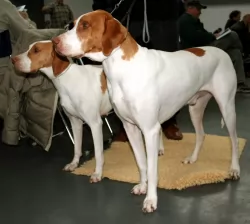 Your attractive Ariege Pointer will give birth to 2 – 8 puppies. If you don’t want puppies, then spaying or neutering is excellent and can actually have many health benefits for your pet.
Your attractive Ariege Pointer will give birth to 2 – 8 puppies. If you don’t want puppies, then spaying or neutering is excellent and can actually have many health benefits for your pet.
This dog with its short coat requires very little maintenance, and a good brush twice a week will ensure the coat remains glossy and shiny, giving you the chance to also check for fleas and ticks.
Don’t just assume every dog has bad breath. Bad breath can be indicative of dental disease, and dental problems can cause all kinds of other illnesses within the body. Make sure that while your pet’s teeth are healthy, that you brush them 2 or 3 times a week with special canine toothbrush and toothpaste.
The Ariege Pointer requires regular exercise as it is a lively, energetic dog. He can adapt to life in the city or the country, but ideally he needs a place with a large garden.
Wherever you keep him as a pet, make sure you take him for walks every day and that you play ball- or rope games with him. Ignoring his exercise needs will turn him into a bored, frustrated pet, and that isn’t fair towards him.
Make sure you choose good quality commercially manufactured foods for him. Adding in some home-made food to his kibble such as cooked brown rice, vegetables and chicken will be wonderfully good for him.
Every dog will require some raw meat added into his diet from time to time. Many skin diseases can be treated by adding in raw meat. After all, before dogs were domesticated they lived on raw meat, and including this ingredient back into their diet guarantees to make a remarkable difference in terms of good health.